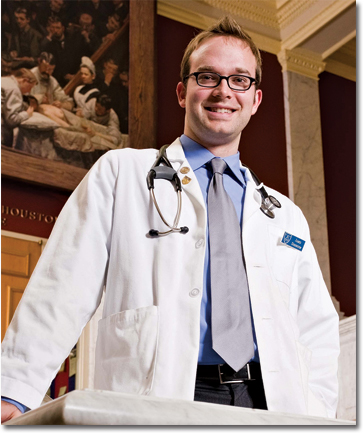The Good Shepherds
What makes it more likely that a Vassar grad who applies to medical or law school will be accepted? Hint: It's more than just the Vassar name.
Vincent Laurence ’87 enrolled at Vassar after the Marine Corps, intending to be pre-med, but his passion for poetry derailed him. He majored in English and went on to do a Maguire Fellowship in Germany, work as a carpenter, write for a fine woodworking and a fine gardening magazine, create landscape designs, and raise bees in Connecticut.
Then, in 2002, he grew impatient. Laurence says he realized he wasn’t using his talents in the right arena — and he kept feeling that old call to medicine. “It’s a very cerebral career, and you change peoples’ lives,” says Laurence. “There are no ifs, ands, or buts about whether you are doing something meaningful with your life.”
When Vassar’s Office for Fellowships and Pre-Health Advising got Laurence’s call for help, they first did a double take. Then, faculty members rolled up their sleeves to assist him. With their guidance, the then 41-year old enrolled in science classes at a university near his home. It took him a few years, but he applied to medical school and is now a fourth-year student at the University of Wisconsin School of Medicine and Public Health. Laurence will be 54 when he’s finally a surgeon, but who’s counting?
Strength in Numbers
The Office for Fellowships and Pre-Health Advising, which provides academic support and guidance for current Vassar students and alumnae/i interested in advanced study, is one of the prime reasons why Vassar alums’ medical school acceptance rate was 79 percent last year. That’s considerably higher than the national acceptance rate of 46 percent.
Vassar’s Pre-Medical Advisory Committee, which is administered through the office, helped another seemingly unlikely candidate—Jim Dodington ’05—down a similar path. “I think what ultimately led me to go to medical school was some wonderful mentoring from some fabulous Vassar professors in the Science, Technology, and Society Program and in the Biology Department,” says Dodington.
This captain of the men’s swim team and campus EMT applied to medical school and for aWatson Fellowship simultaneously in his senior year. He won the prestigious grant, traveling to Botswana and South Africa to work for 1996 alum Ethan Zohn’s Grassroots Soccer organization, which fights the spread of AIDS. Dodington calls his work with sick African children and HIV education in schools “sobering,” but it ultimately reaffirmed his desire to pursue pediatrics at the University of Pennsylvania Medical School.
“What I think is so amazing about Vassar is that, through the college’s Pre-Medical Advisory Committee, you get this dedicated group of professors who spend individual time with you and shepherd you through the medical school process,” says Dodington. “Talking to my other med school friends who went to larger undergraduate universities, [I realized] that individual focus is not always there.”

“Every letter takes at least a day and is five or six pages long,” says committee member James Challey, who is a senior lecturer in the Science, Technology, and Society Program. “Ideally what comes out is a narrative that shows not only what the student has done academically, but who that student is as a person.”
Perhaps most impressive is the fact that the committee does not deny help to anyone wishing to apply to medical school, even if they need extra mentoring. So, the college’s acceptance rate reflects applications by a full spectrum of students. Other schools are more restrictive about who they advise.
Joseph Tanski, a committee member and associate professor of chemistry, says this kind of individual attention is another facet of a Vassar education that leads to success in the pursuit of medicine. “Alot of our students get to do one-on-one laboratory research with faculty, making those students great candidates for doing research or clinical fellowships elsewhere — and excellent candidates for medical school and graduate programs,” says Tanski.
Legal Eagles Take Flight, Too
Vassar’s rate for law school acceptance is even higher than for med school and, at 85 percent, iswell above the national average of 65 percent, according to data from 2007–08. The college’s Office of Career Development fields calls for help from alums who graduated two, five, or even 10 years ago.
Eve Weissman ’06 is one example. She works for New Jersey Citizen Action, a watch dog group focusing on state government, and wants to take her commitment to advocacy to the next level by getting a law degree. “Feedback on my personal statement and résumé has been some of the most important assistance I’ve received from Vassar,” says Weissman, who puts NYU and Berkeley at the top of her list.
Many students have their sights set on research fellowships or grants after graduation, like Jim Dodington did with the Watson, and they too fare well. In 2009 Vassar was ranked a top-five feeder school for Fulbright grants (10 Vassar graduates won them), and two alums won Compton
Mentor Fellowships (only 10 are chosen each year).
“The faculty on the Committee on Fellowships has a lot to do with this,” says Lisa Kooperman, director of the Office of Fellowships and Pre-Health Advising. “Plus, Vassar is a special place. Foundations and professional schools appreciate that — and that helps our students move
on to whatever they want to do.”
—Amy Polacko
Photo Credits: Vincent Laurence, Janelle L. Roghair; Jim Dodington, Michael Pilla
Have comments about this article? Email vq@vassar.edu
